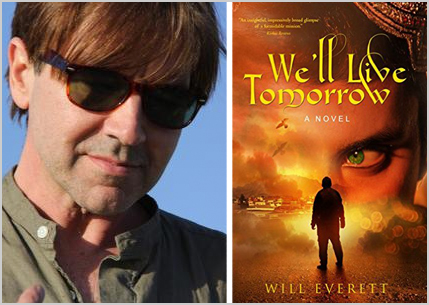Join us in celebrating the recent release of We’ll Live Tomorrow, the debut novel from journalist and aid worker Will Everett.

“Everett’s novel … is about the goals, hopes, faults, and occasionally the success of what he calls Big Aid—in this instance, a postwar reconstruction project more costly than the Marshall Plan that rebuilt Europe after World War II and perhaps even more ambitious.” —Houston Chronicle
“An insightful, impressively broad glimpse of a formidable mission.” —Kirkus Reviews
We’ll Live Tomorrow follows Hunter Ames, an American aid worker grappling with a dark family history and a growing midlife malaise. In an aid compound in southern Afghanistan, under the watchful eyes of the Taliban, he meets the mysterious Karimullah, an exploited “dancing boy” hunted by his master. These two lost souls strike up an unusual friendship in war-torn Afghanistan—Karimullah looking for sanctuary after years of abuse at the hands of a violent master, and Hunter trying to come to terms with his own tragic past. But menacing forces surround them, imbuing their friendship with the promise of salvation and the prospect of tragedy.
While the novel explores a wide range of human-interest issues, such as the doldrums of middle age and the aftershocks of family tragedy, Everett says he had a larger purpose in writing this novel when he did. “Through the book and its layered characters, I hope to give readers an intimate look at a country the U.S. has spent so much time supporting, yet many know little about.”
A native of Texas, Will Everett has reported from the Middle East, South Asia and West Africa for National Public Radio, the BBC, Newsweek and other outlets. With Walter Cronkite he wrote and produced the 2006 documentary World War One Living History Project, honoring the last surviving veterans of World War I. His work has been recognized by the Society for Professional Journalists, the New York Festivals and the National Headliner Awards. He holds a master’s degree from the University of Southern California Annenberg School for Communication and Journalism. His choral collaboration with Joseph Martin, The Message, was published by Hal Leonard in 2015.
